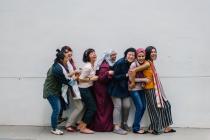These resources were compiled to support the government's engagement around the development of a National Strategy and Action Plans. The strategy, Te Aorerekura, was launched in December 2021. This page lists reports, research and other resources related to ethnic and migrant communities and their experiences of family violence and sexual violence.
Click here to go to our other national strategy engagement pages

Our Issues paper #14 on Ethnic perspectives on family violence in Aotearoa New Zealand (2019) provides an overview of family violence in ethnic communities. It looks at gaps in data, the experience of violence in ethnic communities including cultural forms of violence, risk factors, help-seeking and interventions.
Shama Hamilton Ethnic Women’s Centre published four papers summarising discussions from over 90 ethnic community organisers and therapists about Addressing sexual violence for ethnic communities (2019). The papers summarised findings on prevention and responses to sexual violence. They include general findings and findings specific to diverse groups based on ethnicity, religion, gender, migration journey or sexuality.
The Ministry of Business, Innovation and Employment (MBIE) Recent Migrant Victims of Family Violence Project 2019: Final report (2020) examined policy and practice issues that affect migrant victims of family violence.
The article Mobilising culture against domestic violence in migrant and ethnic communities: practitioner perspectives from Aotearoa/New Zealand (2017) examine at anti-violence interventions in migrant and ethnic communities, and explores concepts of mobilising culture and communities within anti-violence strategies.
Te Ohaakii a Hine – National Network Ending Sexual Violence Together (TOAH-NNEST) updated guidelines for mainstream crisis support services responding to survivors of sexual violence in 2016. The guidelines include information about appropriate and safe practices for frontline staff and services working with victims-survivors from diverse communities and cultures. This includes the Good Practice Guidelines for ‘Mainstream’ Sexual Violence Crisis Services - Working with Asian survivors and Crisis intervention for Muslim women experiencing sexual violence or assault. Both reports include background information and recommendations for practice. Dr Rachel Simon-Kumar has spoken about Why Ethnic Minorities Under-Report Sexual Violence in a podcast.
For information and research specific to Aotearoa New Zealand about migrant youth experiences of intimate partner violence see the following articles in our library:
- Unholy matrimony: forced marriage in New Zealand (Radhakrishnan, 2012)
- Intersections of culture, migration and intimate partner violence as told by migrant youth (Mayeda and Vijaykumar, 2015)
- Developing intimate partner violence intervention services for youth from migrant communities of colour: A technical report for Shakti Community Council, Inc. (Mayeda and Vijaykumar, 2015)
- Moving on: structural violence and age(ncy) in young South Asian women's lifeworlds post-family violence in Aotearoa / New Zealand (Fu, 2014)
The Multicultural Centre for Women's Health, based in Australia, developed a guide to support people and organisations working on violence prevention with immigrant and refugee communities, Intersectionality Matters: Guide to engaging immigrant and refugee communities to prevent violence against women (2017). The guide addresses how gender intersects with other forms of inequality, what is intersectionality, developing a more complex understanding of culture, myths about culture and violence, and questioning racialised representations of violence. The second part of the guide outlines the essential ingredients of meaningful violence prevention initiatives in imigrant and refugee communities.
Search the NZFVC library for more information on migrants, refugees and ethnic communities.


